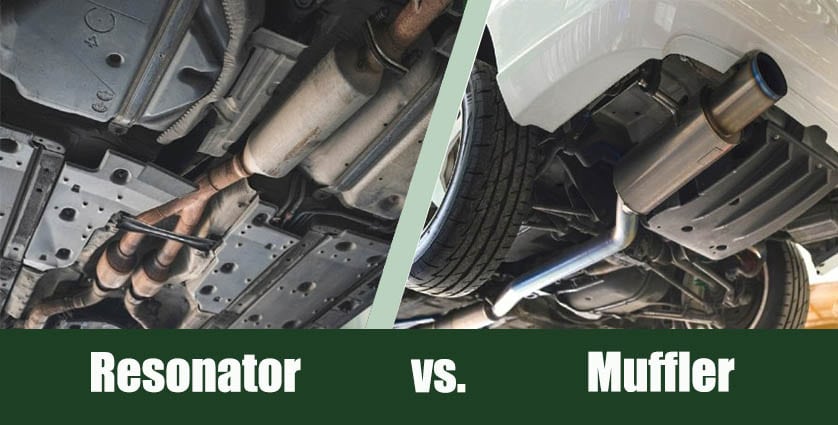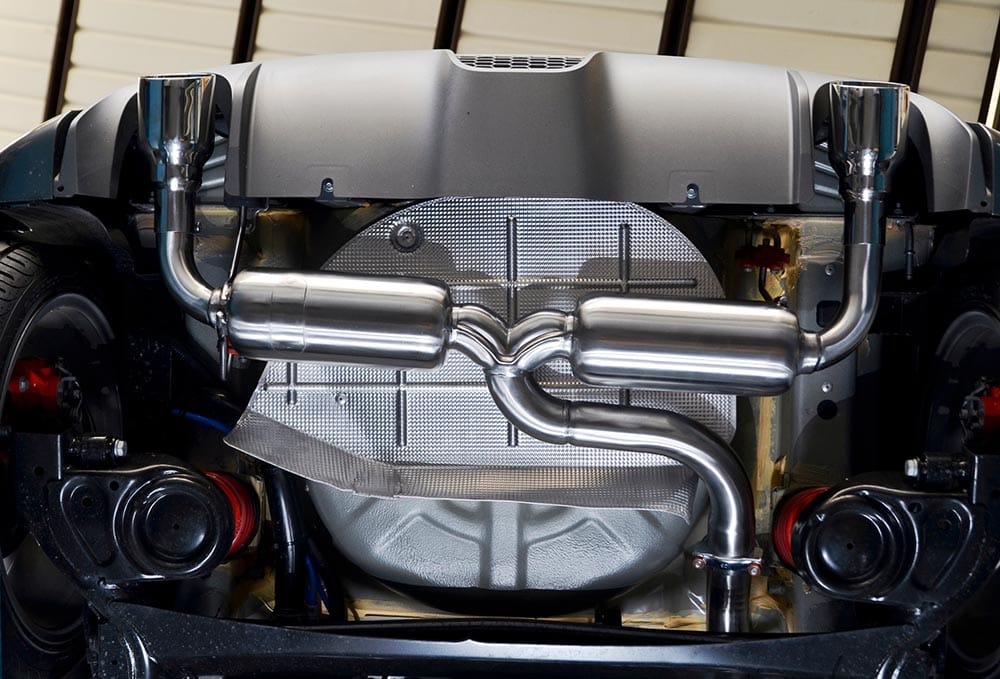Resonator vs. Muffler – What’s the Difference?
-
Codee Chessher
- Last updated:

Cars are a marvel of modern engineering, but a lot of stuff under the hood gets overlooked. For instance, your exhaust system has a resonator and a muffler that work hand in hand to minimize how much noise your car engine makes. How exactly are they different, though? Let’s take a look at some of the most important differences between resonators and mufflers.
 Overview of Resonator
Overview of Resonator
Resonators are a key part of your exhaust system, eliminating certain sounds, buzzes, and hums by modulating them. While they do nothing on their own to reduce the volume of your exhaust, they make it easier for your muffler to reduce and eliminate exhaust. Without a resonator, your muffler wouldn’t be nearly as quiet as it is.
How Does a Resonator Work?
Resonators work by eliminating sounds from certain frequencies, but how? The interior of a resonator is a hollow steel tube surrounded by steel wool and sound-deadening material. When sound from the engine travels to the exhaust, the sound bounces around this tube, and certain undesirable sounds are eliminated. After that, the remaining sounds go to the muffler, which reduces what’s left.
Do I Need a Resonator?
Well, most cars come with resonators by default for a reason, so we’d argue that, yes, you do need one. If you were to remove your resonator, it would also increase your fuel usage. In fact, some people purposely remove their resonators to maximize horsepower. However, you’ll pay more at the pump and your car’s exhaust will sound differently.
What Is a Resonator Delete?
A resonator delete is when you remove your car’s resonator on purpose to change the sound the exhaust makes. In some cases, people do it to make the car as light as possible. The main difference is that it gives your engine a more aggressive sound, but it also allows droning and other undesirable noise. Resonator deletes are common in areas that don’t allow muffler deletes.
- Eliminates certain sound frequencies to modulate engine noise, buzzes, hums, and other undesirable noises
- Adds a bit of weight to your car
- May restrict airflow
Overview of Muffler
Mufflers are a key part of any exhaust system, moderating and eliminating the bulk of the noise emanating from your engine. Factory mufflers are typically more restrictive than aftermarket mufflers because car factories have to work with sound laws, manufacturing costs, and fuel efficiency.

How Do Mufflers Work?
Mufflers are perforated tubes with baffles that moderate and deaden exhaust noise. As exhaust gas is pushed through the tube, the gas expands, and the muffler reduces noise by pushing the gas out of the system through an indirect path. There are many types of mufflers that produce different exhaust notes, which is the noise your exhaust makes.
What Is a Muffler Delete?
A muffler delete is a modification where you remove the muffler from your car. Outright removing your muffler is universally illegal in all US states, so most muffler delete kits have you bolt on a straight pipe that does nothing to reduce noise. Muffler deletes are commonly performed to get a minor performance boost, but they make your car very loud and use more fuel. You may also violate local noise ordinance laws if the muffler delete makes your vehicle too loud.
- Reduces and eliminates exhaust sound
- Comes in many different designs to produce different exhaust notes
- Makes your car more fuel-efficient
- May slightly reduce horsepower
What Is the Difference Between the Two?
Resonators modulate and change the way your exhaust sounds while eliminating some sounds like droning. Mufflers, on the other hand, are what actually reduce the sound from your exhaust.
Another major difference is that a muffler can work without a resonator, but a resonator by itself is pretty useless. It would change the way your exhaust sounds but won’t actually make your exhaust quieter.
Finally, removing your muffler is illegal, while removing your resonator isn’t in most states and locales. This is because the muffler is the more critical component that protects other drivers and pedestrians from excessive noise and exhaust fumes. While removing your resonator might make the exhaust sound different and introduce annoying sounds, it won’t affect the volume of your exhaust very much, if at all.
 Conclusion
Conclusion
Mufflers and resonators work hand in hand to modulate and eliminate unwanted noises while reducing your exhaust’s volume and the amount of exhaust gas that comes out. While a muffler will work without a resonator, a resonator cannot work to its fullest potential without a muffler.
Featured Image Credit: (L) | (R) Setta Sornnoi, Shutterstock
Contents
 Overview of Resonator
Overview of Resonator